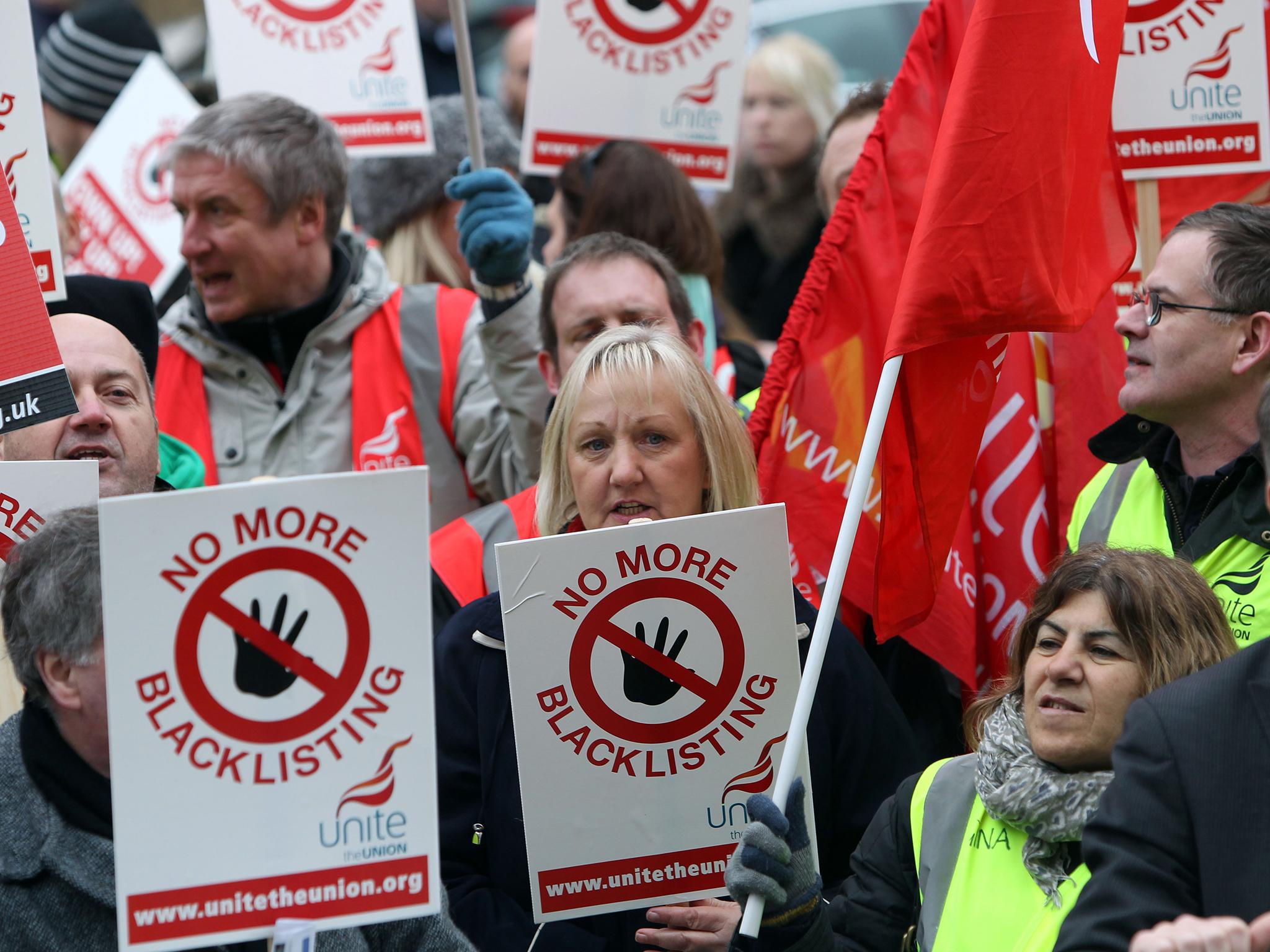Police ‘infiltrated’ trade unions providing information to construction industry about worker blacklist, hear campaigners
'When we first talked about police collusion in blacklisting, people thought we were conspiracy theorists,' says Dave Smith, secretary of the Blacklist Support Group

The police and Special Branch infiltrated trade unions and provided information to the construction industry about a blacklist of workers, campaigners have been told.
The revelation was made in a letter in response to a complaint from the Blacklist Support Group to the Independent Police Complaints Commission.
“Allegation: Police, including Special Branches, supplied information that appeared on the blacklist, funded by the country’s major construction firms, the Consulting Association and/or other agencies, in breach of the Data Protection Act 1998," the letter says.
“The report concludes that, on the balance of probabilities, the allegation that the police or Special Branches supplied information is ‘proven’.”
A blacklist of construction workers was exposed in 2009 with the discovery that an organisation called the Consulting Association kept secret files on thousands of trade union members, often for raising concerns about safety on building sites. Workers on the illegal database were denied employment on construction projects.
Millions of pounds have since been paid out in compensation by some of the country’s biggest construction firms.
An inquiry is currently being held in the High Court into undercover policing.
Dave Smith, secretary of the Blacklist Support Group, said he had waited six years for the news.
“When we first talked about police collusion in blacklisting, people thought we were conspiracy theorists," he said. "We were told ‘things like that don’t happen here’. With this admission from the Met Police, our quest for the truth has been vindicated.
“The police are supposed to detect crime; instead they infiltrated trade unions and provided intelligence to an unlawful corporate conspiracy. This is why we need the public inquiry into undercover policing to be open and transparent, in order to get to the truth about how police intelligence was shared with private sector third parties including major companies.”
A statement from London's Metropolitan Police Service (MPS) said the force "apologised for the delay in providing the complainants with the outcome to the investigation carried out into allegations that members of the Special Demonstration Squad (SDS) and MPS Special Branch provided information to the ‘blacklist’.
“The ‘blacklist’ is said to have been funded by the major firms in the construction industry. Allegations about police involvement with the ‘blacklist’ will be fully explored during the Undercover Policing Public Inquiry (UCPI), which will hear detailed evidence regarding this subject.
“At this stage the MPS will await the conclusions of the UCPI before considering what steps should be taken next."
It added: “In November 2012, the original complaint was received by the MPS. An investigation into the allegations was carried out by Operation Herne, the team investigating allegations of crime and misconduct by the SDS overseen by chief constable Mick Creedon.
“That investigation concluded that the MPS had provided information to the ‘blacklist’, but there was no evidence this had been done by members of the SDS and the sharing of information did not appear to be systematic. The investigation did not consider the conduct of other law enforcement bodies.
“The retrospective application of the Data Protection Act determined that, had the act been applicable at the time, certain conduct would have constituted the improper sharing of information. At this stage the MPS has notified complainants that, until the UCPI has assessed all the evidence, no further action will be taken.”
Imran Khan QC, who is representing blacklisted workers, said: “The delay from the Metropolitan Police in responding to our complaint at a time when there has been so much public and parliamentary interest in the matter is concerning to say the least.
“The blacklisted workers that I represent have clearly suffered a grave injustice; to find out that some of the information on the unlawful blacklist was supplied by the custodians of law and order only compounds the injury. My clients deserve full disclosure and we have now requested a full copy of their internal investigation report. We hope the police response does not take so long this time around.”
Unite union assistant general secretary Gail Cartmail said: “This is a major breakthrough. The police have finally been forced to admit what we already knew – that they were knowingly and actively involved in the blacklisting of construction workers. It is disgraceful that they have chosen to sit on this admission of guilt for so long.
She added: “This admission is yet another reason why we need a full public inquiry into blacklisting. It is also why it is absolutely essential that the inquiry into undercover policing led by judge Mitting is entirely transparent. That inquiry’s primary focus must be about exposing the abuses that undercover police officers were responsible for, rather than protecting the identities of the police officers involved.”
Justin Bowden, national officer of the GMB, said: “The secret blacklisting of 3,213 construction workers and environmentalists was the greatest employment scandal in 50 years. When GMB launched the first High Court claims on behalf of those blacklisted, there were many in the establishment who said we had paranoid conspiracy theorists.
“Admission by the police that they were directly and deeply involved in denying ordinary working people – who in many cases had done little more than raise health and safety concerns – from work and the chance to support themselves and their families is a constitutional crisis that can only be properly addressed by a full, independent public inquiry.
“This admission also raises some serious questions regarding other connected cases.”
PA